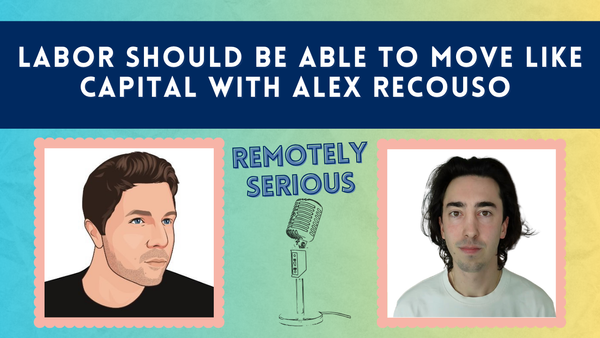Introducing 'Remotely Serious'

Sponsored by Insured Nomads

Here's what we've got for you today:
- Rebranding our newsletter to Remotely Serious
- A new era for remote work
- Digital Nomads In Residence week in Central Istria, Croatia
- Five kinds of remote workers you'll meet...
- WorkationList update
- Remote work news from around the Internet
We've gone through a redesign and rethink, and we're back.
Remotely Serious
(Editor's note: since we published this page in early 2023, we have in fact launched! Remotely Serious is available on all major podcast platforms.)
After one year in the biz, we are rebranding our newsletter to Remotely Serious. There's nothing particularly wrong with The Wayviator Newsletter or whatever loose terminology we used before.
We're just expanding our scope of activities in 2023, and we thought this was better.
Now that I mention it, 'Expanding our scope' seems like vague business jargon. What do we actually mean by this? Well, to be direct, here are two things:
- We are launching a podcast in 2023. We'll have episodes with terrific guests, doers, pioneers, and thought leaders from the world of remote work. The first episodes are coming in February. Let us know if you know someone who might be a fantastic guest.

- And... we are increasingly being approached to consult with regions and destinations on their digital nomad and remote work strategy. We may talk more about this at some point, but promoting these services is not the point of this newsletter.

This newsletter's mandate is and shall remain to deliver our direct thoughts on remote work directly to our loyal readers.
That's it!
Nothing too crazy or fancy, but we are working on an expansion of our mandate. With everything going on, our weekly musings on remote work will come out as Remotely Serious (also the title of the upcoming podcast).
It's a new era for the conversation about remote work
The conversation around remote work waxes and wanes in phases, influenced by the media cycle and the macroeconomic environment. This fall, I've been thinking about hundreds of thousands of people whose preoccupation is not necessarily their next remote work destination.
Many layoffs have come to the tech sector and other sectors — the highest talent cutbacks since the dot-com era.
Most countries worldwide are expecting a year-long recession (or worse).
The exuberance of the workforce trend of 'quiet quitting' and the employee leverage of a bull market one year ago is petering out. People are working harder to keep their jobs.
Labor market power is reverting back to increasingly frugal, belt-tightening employers. But for millions of people, even with a heightened sense of economic anxiety, there is still no going back to the old ways of the 9-5 in-person office.
We started writing about remote work early in 2022, as winter was ending.
Now, winter is coming. Weather is a big driver of remote work movement, and we'll be watching where people migrate this winter, especially the Canadians, Americans, and Northern Europeans who are most affected by the changing of the season.
With the recessionary environment, the dual priorities of cost of living and pleasant weather will propel a few million people (at least) to take a leap they have never taken before — to foreign countries that offer a temporary or permanent adjustment to their quality of life.
Here's what's going on in Central Istria this week!

Croatia is still attracting nomads in the quote-unquote "off-season"!
In Central Istria, a rural area of Croatia, digital nomads have gathered for a week of workshops, knowledge transfer, and deep work.
Croatia's tourism calendar is dominated by the changing of the seasons, and coastal areas with a heavy tourist influx experience a bustling high season in the summer, a shoulder season, and an 'off-season' in the winter.
A primary goal of the Digital Nomads in Residence project, which brings a tight group of motivated remote workers together, is to showcase how a rural area can serve as an attractive place to work remotely — outside of the traditional 'boundaries' of the tourist calendar.
Mita Carriman, speaker and panelist at Digital Nomads in Residence this week, had more to say:

"I think it's a genius move for Central Istria to position itself as an off-season winter destination for digital nomads, particularly one that focuses on gourmet food experiences," said Mita.
"Winter is an ideal time for deep, introspective creative work, so I find it a really attractive proposition to head to Central Istria for a cozy, focused remote work experience with few distractions and incredible food, wine, and nature experiences in between."
Within Croatia, Central Istria joins the cities of Zagreb, Split, and Dubrovnik, as well as various island destinations, as a jurisdiction competing for the global remote worker population.
Genres of remote workers
In one year of covering the remote work beat and speaking with hundreds of remote workers, we have really started to understand the psychology of remote workers — including the various 'ice cream flavors' of people out here.
We have to think about this, to understand what will be helpful to our readers.
Here are a few categories we have observed:
The Adventurer
It's not too hard to understand. This is the person who wants to see the world and work while doing it. The journey is the destination.
The Adventurer wants the opportunity to see many countries, wander through foreign cities, learn new languages, hike exotic peaks, and generally 'live the dream'.
Adventurers look at the twelve-month calendar and see an opportunity to design their best backpacker fantasy — except with a productive work ethic and a higher need for fast Wi-Fi, coworking spaces, and a steady remote income than what we associate with previous generations of vagabonds.
The Community-Seeker
This person might look like an Adventurer, but what they are looking for is actually something most of us are looking for in some way — community.
They might look like Adventurers at first, but they are ready to settle down in an area once they find a group of like-minded people, or (let's be honest) an attractive and compatible romantic partner during their travels.
Community-seekers gravitate to more permanent communities. They might fundamentally relocate to official nomad villages in Madeira, Portugal, or Pipa, Brazil. They might settle down semi-permanently in cities with thriving nomad communities — Lisbon, Mexico City, Chiang Mai, or Gran Canaría.
There have always been people whose local suburban or urban environment doesn't 'speak to their soul' as much as a theoretical 'other place out there.'
To quote Beauty and the Beast, it's a tale as old as time.
Luckily, for people who are pining for a community out in the world that might be a fit for them, there are increasingly safe and easy ways to actually go out and explore these possibilities without having to make the difficult choice between work and travel.
The Tax Libertarian
You can call them the crypto bro, the offshore passport enthusiast, the libertarian, the maverick, the freedom-seeker, etc.
These folks are upfront about what they want — more freedom from governments and taxation. This does not necessarily mean that they are doing anything illegal, but in a sense, they want the freedom to choose which jurisdictions apply to them.
The tax libertarian may or may not make a high income, but whether they are already high-income or simply aspiring to be, they are looking for the legal freedom to avoid the usual 40-50% progressive taxation brackets of their birth country.
Five years ago, a significant portion of the activity in this subculture was shady, black hat, and mostly illegal (frankly — simply working in a foreign country without a visa was technically illegal).
Hiding money in the Cayman Islands with the (spoiler alert) corrupt law firm from John Grisham's The Firm? That's bad news.
Taking advantage of low tax rates in countries with approved, legal pathways for temporary and permanent residency and the right to work?
Well, that's arguably not so bad — and it's the basis for a new era for those who are aspiring to more self-sovereignty in their lives.
The Nomad Family
The nomad family is the remote worker profile that interests me the most going into 2023. Every subgenre I have described thus far is centered around the needs and desires of the individual.
But nomad families — where one or both partners have access to remote income — are new, emerging, major economic actors in the world of remote work.
Nomad families may or may not have a growing family. Some have kids — but some might have adult children or no children. The profile of the 'two-income, no kids' nomadic couple honestly might merit its own subgenre.
At the risk of making a blanket generalization for which there are many, many exceptions, I'll say this:
Families and couples tend to spend time with each other, not random people they just met a week ago.
The needs of families are different. They do seek a social reason to visit a remote work destination.
But if they are in a certain routine as a family, they are not necessarily burning to meet a bunch of new strangers and join a community of random people.
They want to make memories with each other and seek out slightly more private activities and accommodations to accomplish this goal than the broader remote worker community.
The Hobbyist
I'll add a fifth subgenre to this by-no-means-exhaustive list of psychographic profiles.
'Hobbyist' is a term I use loosely for anyone who chooses their destination based on a very specific activity:
- A skier who chooses to be near the mountains
- A language learner who chooses to go somewhere where their target language is spoken
- A foodie who wants to experience a specific, authentic cuisine
- An entrepreneur who wants to be in a place where their industry is concentrated
- A beach-lover who wants to increase their annual dose of sunshine from 100 to 300 days.
These people may care about the community, or they may care about the cost of living — but these priorities are inherently subordinate or secondary to their obsession with their goal activity, whatever it may be.
WorkationList is our growing directory for workation opportunities

We just completed a significant update to the database of workations at WorkationList, our directory for group packages that cater to digital nomads and remote workers.
Check it out if you haven't seen it yet, or lately!
This week's newsletter is brought to you by Insured Nomads
We want to thank Insured Nomads for being our long-standing sponsor.
Insured Nomads makes travel as safe and smart as staying at home.
That's a tagline, but it's also a deep part of the ethos of Remotely Serious. We encourage people to plan their remote work lifestyle with the same prudence, sense of risk management, and financial acumen that one would use in planning life in the suburbs or cities of your home country.
Insured Nomads provides a global health and travel insurance product that gives you country-native health care coverage "like what the locals have" in over a hundred countries. We appreciate their partnership in 2022.
Remote work news from around the Internet
Spain's digital nomad visa takes off - Time Out
Remote work is inherently unequal and favors 'metropolitan elites' - Forbes
The office apocalypse continues - Business Insider
Over 60 million commuting hours saves by remote work (70 human lifetimes?) - CNBC
Choosing a digital nomad life in Greece - ekathimerini.com
See you next week!





